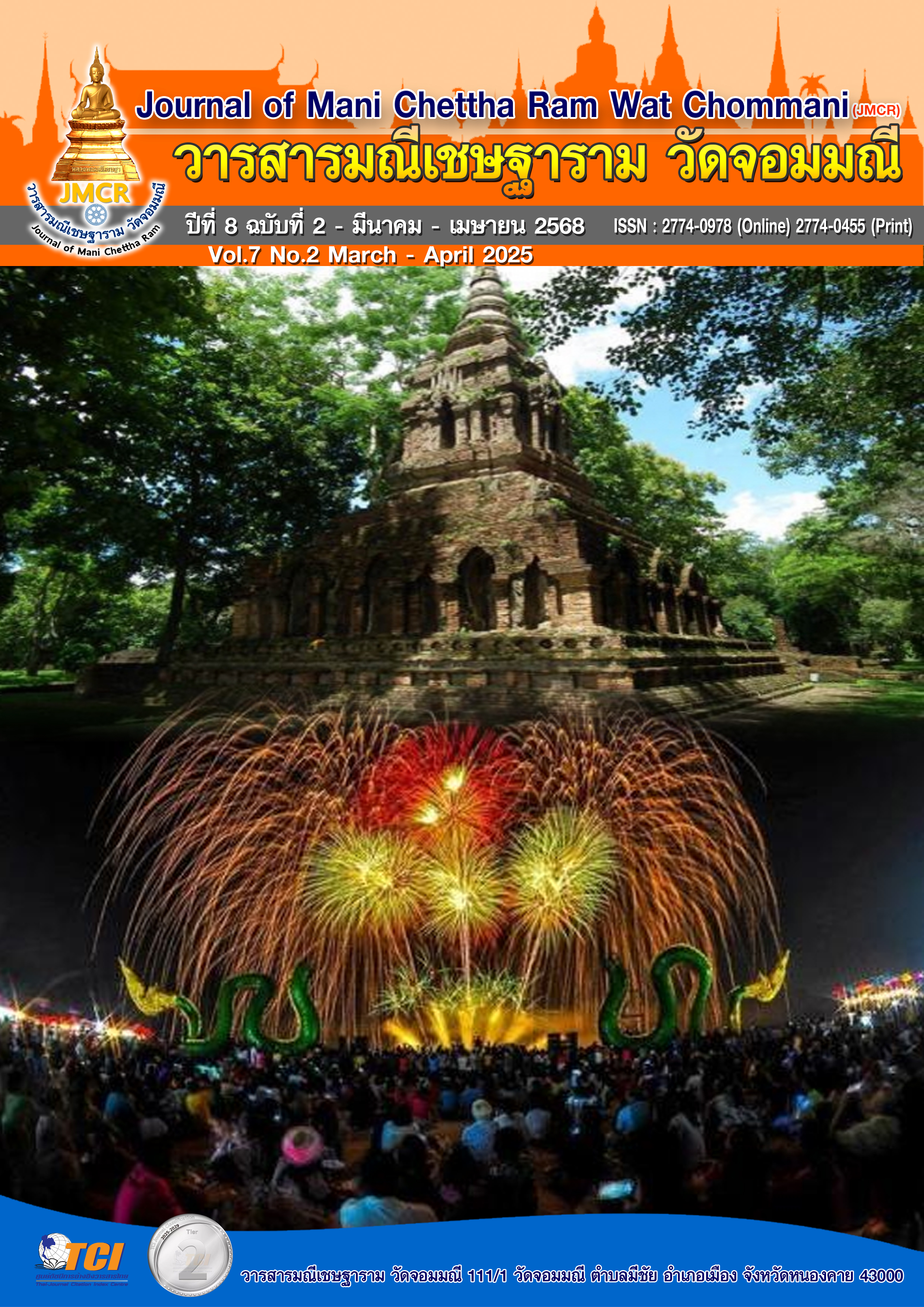DEVELOPMENT OF LEARNING BASIC COUNTING PRINCIPLES USING PROBLEM-BASED LEARNING WITH GEOGEBRA TO ENHANCE ACADEMIC ACHIEVEMENT, IMPROVE ATTITUDES, AND REDUCE MATHEMATICS ANXIETY OF MATHAYOMSUKSA 4 STUDENTS
Keywords:
problem-based learning, GeoGebra, mathematics achievement, attitude toward mathematics, mathematics anxietyAbstract
The purposes of this research were to 1) develop learning activities using problem-based learning with GeoGebra program on Basic Counting Principles for Mathayomsuksa 4 students to meet the efficiency criterion of 70/70, 2) study mathematics achievement, attitudes toward mathematics, and mathematics anxiety, 3) compare learning achievement and attitudes towards mathematics before and after instruction, 4) compare mathematics achievement and attitudes toward mathematics with the 70 percent criterion, and
5) compare changes in attitudes and anxiety toward mathematics at different time intervals. The sample consisted of 39 Mathayomsuksa 4 students selected by cluster random sampling. The research instruments included 1) lesson plans on Basic Counting Principles using problem-based learning with GeoGebra, 2) an achievement test, 3) attitude and anxiety assessment forms. Data were analyzed using percentages, means, standard deviations, and t-tests.
The results showed that 1) The learning activities had an efficiency of 83.31/78.63, higher than the established 70/70 criterion. 2) After participating in the learning activities, students' mathematics achievement increased, attitudes towards mathematics improved, and mathematics anxiety decreased. 3) Post-instruction achievement and attitudes towards mathematics were significantly higher than pre-instruction at the .05 level. 4) Mathematics achievement had a mean of 23.59, and attitudes towards mathematics had a mean of 4.51, both significantly higher than the 70 percent criterion at the .05 level. and 5) Regarding changes in attitudes and anxiety towards mathematics over time, attitudes continuously improved while anxiety notably decreased.
References
กระทรวงศึกษาธิการ. (2560). ตัวชี้วัดและสาระการเรียนรู้แกนกลาง กลุ่มสาระการเรียนรู้คณิตศาสตร์ (ฉบับปรับปรุง พ.ศ. 2560) ตามหลักสูตรแกนกลางการศึกษาขั้นพื้นฐานพุทธศักราช 2551. กรุงเทพมหานคร: โรงพิมพ์ชุมนุมสหกรณ์การเกษตรแห่งประเทศไทย.
ดวงหทัย กาศวิบูลย์ (2561). การเรียนรู้โดยใช้ปัญหาเป็นฐานสำหรับครูคณิตศาสตร์ (Problem-Based Learning for Mathematics Teachers). เชียงใหม่ : ภาควิชาหลักสูตร การสอนและการเรียนรู้ คณะศึกษาศาสตร์ มหาวิทยาลัยเชียงใหม่.
ธีรวุฒิ เอกะกุล. (2550). การวัดเจตคติ. (พิมพ์ครั้งที่ 2). อุบลราชธานี: วิทยาออฟเซทการพิมพ์.
บุญชม ศรีสะอาด. (2541). การพัฒนาการสอน. กรุงเทพมหานคร: สุรีวิทยาสาส์น.
ประวีณ์นุช วสุอนันต์กุล. (2566). แนวทางการจัดการเรียนรู้ตามรูปแบบวัฏจักรการสืบเสาะความรู้ร่วมกับการประยุกต์ใช้เทคนิค STAD ผสมสื่อ GeoGebra ที่ส่งเสริมมโนทัศน์ทางคณิตศาสตร์. วารสารมหาวิทยาลัยราชภัฏยะลา, 18(3), 33-42.
ปุณญนุช เขียวไกร. (2565). การจัดกิจกรรมการเรียนรู้โดยใช้ปัญหาเป็นฐานเพื่อเสริมสร้างเจตคติเชิงบวกและลดความวิตกกังวัลต่อวิชาคณิตศาสตร์ของนักเรียนชั้นมัธยมศึกษาปีที่ 2. ใน วิทยานิพนธ์ปริญญามหาบัณฑิต. มหาสารคาม: มหาวิทยาลัยราชภัฏมหาสารคาม.
ภูมิพัฒน์ สุดเสน่ห์. (2566). ผลการจัดการเรียนรู้โดยใช้ปัญหาเป็นฐาน เรื่อง กำหนดการเชิงเส้น ที่มีต่อความสามารถในการแก้ปัญหาทางคณิตศาสตร์ ของนักเรียนชั้นมัธยมศึกษาปีที่ 6. วารสารการบริหารนิติบุคคลและนวัตกรรมท้องถิ่น, 9(8), 1367-1379.
โรงเรียนเทศบาลบูรพาพิทยาคาร. (2567). ข้อมูลพื้นฐาน.ข้อมูลนักเรียน. เรียกใช้เมื่อ 18 กันยายน 2567 จาก https://www.bppschool.ac.th/index.php/about/2019-09-07-07-48-33.
ศิริลักษณ์ ภักดีรักษ์. (2566). การพัฒนาทักษะในการแก้ปัญหาทางคณิตศาสตร์ เรื่อง ทฤษฎีบทพีทาโกรัส สำหรับนักเรียนชั้นมัธยมศึกษาปีที่ 2 โดยใช้โปรแกรม GeoGebra ประกอบการจัดการเรียนรู้แบบ (KWDL). วารสารครุศาสตร์ มหาวิทยาลัยราชภัฏวไลยอลงกรณ์, 1(2), 52-65.
สิทธิชัย พานิชย์วิไล. (2566). การพัฒนาการจัดการเรียนรู้ที่เน้นปฏิบัติการทางคณิตศาสตร์ตามแนวทฤษฎีโซเชียล คอนสตรัคติวิสต์ร่วมกับโปรแกรม GeoGebra ที่ส่งเสริมความคิดสร้างสรรค์ทางคณิตศาสตร์ เรื่อง วงกลม ของนักเรียนระดับชั้นมัธยมศึกษาปีที่ 3. วารสารศึกษาศาสตร์ มหาวิทยาลัยนเรศวร, 25(3), 286-296.
Furner, J. M. (2024). The Best Pedagogical Practices for Teaching Mathematics Revisited: Using Math Manipulatives, Children's Literature, and GeoGebra to Produce Math Confident Young People for a STEM World. Pedagogical Research, 9(2).
Hembree, R. (1990). The Nature, Effects, and Relief of Mathematics Anxiety. Journal for Research in Mathematics Education. 21(1), 33-46.
Krajcik, J. S., Blumenfeld, P. C., Marx, R. W., & Soloway, E. (1994). A collaborative model for helping middle school science teachers learn project-based instruction. The Elementary School Journal. 94, 483-497.
La Ode Ahmad Jazuli, Kodirun, Fiqra Purnama Zahra. (2024). Problem-Based Learning Model Assisted by GeoGebra for Students' Mathematical Conceptual Understanding. Jurnal Amal Pendidikan, 5(2), 158-169.
Mayasari, F., Napitupulu, E. E., & Sinaga, B. (2024). Development of GeoGebra Assisted Learning Modules to Improve Mathematical Representation Abilities and Self Regulated Learning of Senior High School. Mathline: Jurnal Matematika dan Pendidikan Matematika, 9(2), 481-500.
Othman, H., Mohd Salleh, B., & Abdullah, S. (2013). 5 Ladders of Active Learning: An Innovative Learning Steps in PBL Process. In K. M. Yusof, M. Arsat, M. T. Borhan, E. D. Graaff, A. Kolmos, F. A. Phang (Eds.), PBL Across Cultures (pp. 245-25 Aalborg: Aalborg University Press.
Pizzie, R. G., & Kraemer, D. J. (2023). Strategies for remediating the impact of math anxiety on high school math performance. npj Science of Learning, 8(1), 44.
Wakhata, R., Balimuttajjo, S., & Mutarutinya, V. (2024). Relationship between students’ attitude towards, and performance in mathematics word problems. Plos one, 19(2), e0278593.
Wilson, J. W. (1971). Evaluation of Learning in Secondary School Mathematics in Handbook on Formative and Summative Evaluation of Student Learning. New York: U.S.A. McGraw-Hill.




